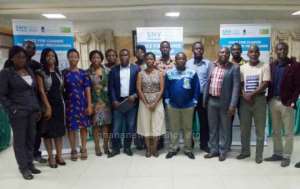
Dr Francis Kemausour, a Senior Lecturer, Kwame Nkrumah University of Science and Technology, on Wednesday said in addressing private sector concerns on mini-grid electrification, competitive bidding should be introduced on the basis of tariffs.
He noted that tariffs should be cost reflective to attract private sector, or at least cover running cost, so that government could provide capital subsidy.
Dr Kemausour made these remarks in his presentation on the mini-grid policy study at a validation workshop for improved Cook stoves and mini-grids policy studies in Accra.
The event, which was organised by SNV Netherlands Development Organisation, provided the platform for stakeholders to identify the key gaps in the two policies and as well make recommendations.
He said Government, through the Ministry of Energy has recognised that the deployment of renewable energy based mini-grids in island areas offers a long term and sustainable solution to the problem, and it is therefore, leading the development of mini-grids.
However, he said the pace is slow and actual commitment of funds not assured, again the existing policy on mini-grid is inadequate and lacks details while regulatory and certification frameworks are not presently available.
The Senior Lecturer said there should be room in the policy for the private sector to also build, own, operate and maintain mini-grids in defined spaces in the country.
Dr Kemausour in his presentation on improved cookstoves policy said there was no formally defined governance structure for the cook stove sector in Ghana.
He said import duty and Value Added Tax (VAT) on imported stoves translates to high cost for consumers, discouraging the purchase of improved Cookstoves, especially when there were cheaper alternatives on the market.
He therefore, proposed that government should develop governance structure for the cookstove sector, which should be under the joint chairmanship of the Ministry of Energy and Ministry.
Mr Wisdom Ahiataku-Togobo, the Director, Renewable and Alternative Energy at the Ministry of Power, said Ghana wants to achieve universal power access by the year 2020.
He noted that at the moment the nation was 85 per cent covered with electricity, and that, the government was perusing grid extension, however, for communities that were very remote and could not be covered with the national grid, the policy target was to deploy the mini-grid electrification.
Mr Eric Banye, the Country Director for the V4C Partnership Programme at SNV, said the workshop enabled participants to review the two policies, as part of the implementation of the Voice for Change Partnership Programme.
He said ultimately what they were seeking to do was to ensure that there was clean access to cooking and improve access to rural electrification, especially in the island communities that are not connected to the national grid.
Mr. Banye said they would incorporate all inputs from participants and then complete the research document.




 We’ll no longer tolerate your empty, unwarranted attacks – TUC blasts Prof Adei
We’ll no longer tolerate your empty, unwarranted attacks – TUC blasts Prof Adei
 Bawumia donates GHc200,000 to support Madina fire victims
Bawumia donates GHc200,000 to support Madina fire victims
 IMF to disburse US$360million third tranche to Ghana without creditors MoU
IMF to disburse US$360million third tranche to Ghana without creditors MoU
 Truck owner share insights into train collision incident
Truck owner share insights into train collision incident
 Paramount chief of Bassare Traditional Area passes on
Paramount chief of Bassare Traditional Area passes on
 Two teachers in court over alleged illegal possession of BECE papers
Two teachers in court over alleged illegal possession of BECE papers
 Sunyani: Victim allegedly shot by traditional warriors appeals for justice
Sunyani: Victim allegedly shot by traditional warriors appeals for justice
 Mahama vows to scrap teacher licensure exams, review Free SHS policy
Mahama vows to scrap teacher licensure exams, review Free SHS policy
 Government will replace burnt Madina shops with a new three-story, 120-store fac...
Government will replace burnt Madina shops with a new three-story, 120-store fac...
